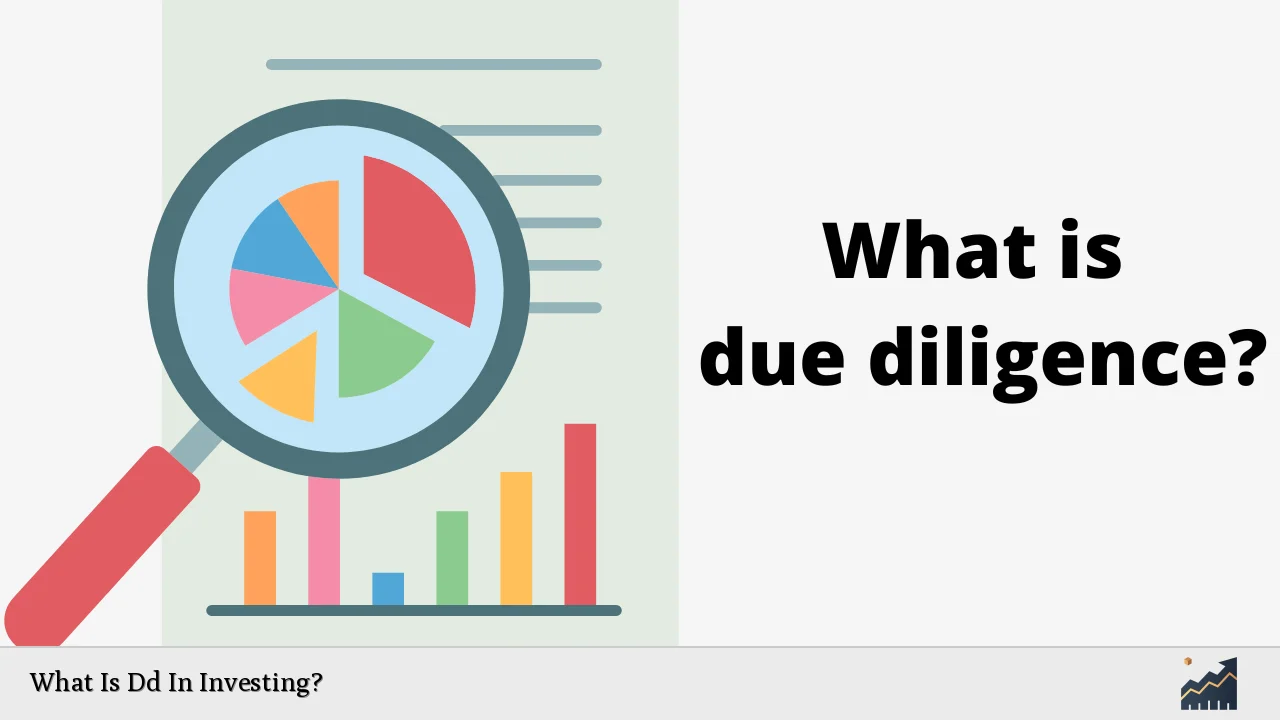In the realm of investing, the term “DD” primarily stands for “Due Diligence.” This concept is crucial for investors as it refers to the comprehensive investigation and analysis conducted before making an investment decision. Due diligence involves assessing a company’s financial health, market position, and potential risks associated with the investment. The goal is to ensure that investors make informed choices based on factual data rather than speculation or hearsay.
When investors mention “doing your DD,” they are essentially advising others to conduct thorough research on a stock or investment opportunity. This process can significantly reduce the risk of financial loss and increase the likelihood of achieving favorable returns. Due diligence is not only applicable to stocks but also extends to various types of investments, including real estate, private equity, and venture capital.
The importance of due diligence cannot be overstated. It acts as a safeguard against poor investment decisions, helping investors identify red flags and opportunities that may not be immediately apparent. By performing due diligence, investors can better understand the underlying fundamentals of a company, its competitive landscape, and its future growth potential.
| Term | Meaning |
|---|---|
| DD | Due Diligence |
Understanding Due Diligence in Investing
Due diligence encompasses a variety of processes and analyses that investors undertake to evaluate an investment’s viability. It involves gathering relevant information about a company or asset and analyzing it to make informed decisions.
Key Components of Due Diligence
1. Financial Analysis: This includes reviewing financial statements such as balance sheets, income statements, and cash flow statements. Investors look for trends in revenue growth, profit margins, and overall financial health.
2. Market Research: Understanding the industry landscape is essential. Investors assess market size, competition, and economic conditions that could impact the investment.
3. Legal Considerations: Legal due diligence involves examining contracts, compliance with regulations, and any potential legal issues that could affect the investment.
4. Operational Assessment: Evaluating the company’s operations helps investors understand its efficiency and scalability. This includes analyzing supply chains, production processes, and management practices.
5. Risk Evaluation: Identifying potential risks is crucial for making informed decisions. Investors assess market volatility, regulatory risks, and company-specific challenges.
By systematically addressing these components, investors can create a comprehensive picture of an investment’s potential risks and rewards.
The Importance of Conducting Due Diligence
Conducting due diligence is vital for several reasons:
- Risk Mitigation: By thoroughly investigating an investment opportunity, investors can identify potential pitfalls that may lead to financial losses.
- Informed Decision-Making: Due diligence equips investors with the knowledge needed to make sound decisions based on data rather than emotions or speculation.
- Valuation Accuracy: Understanding a company’s fundamentals helps investors determine whether its stock price is undervalued or overvalued.
- Long-Term Success: Proper due diligence fosters a disciplined approach to investing, which can lead to more consistent long-term returns.
Investors who neglect due diligence may find themselves facing unexpected challenges or losses. Therefore, it is essential to prioritize this process in any investment strategy.
Steps to Perform Effective Due Diligence
Performing effective due diligence involves a structured approach that can streamline the research process. Here are key steps to follow:
1. Define Objectives: Clearly outline what you aim to achieve with your investment. This could include capital appreciation, income generation, or diversification.
2. Gather Information: Collect all relevant data about the company or asset you are considering. This includes financial reports, market analyses, and legal documents.
3. Analyze Financial Health: Review financial statements to assess profitability, revenue trends, debt levels, and cash flow stability.
4. Evaluate Market Position: Understand where the company stands in its industry by analyzing competitors and market trends.
5. Identify Risks: List potential risks associated with the investment and assess their impact on your overall strategy.
6. Consult Experts: Seek insights from financial analysts or industry experts who can provide additional perspectives on your findings.
7. Document Findings: Keep detailed records of your research and analyses for future reference and decision-making processes.
By following these steps systematically, investors can enhance their understanding of potential investments and make better-informed choices.
Common Mistakes in Due Diligence
Despite its importance, many investors make common mistakes during the due diligence process that can lead to poor outcomes:
- Rushing the Process: Taking shortcuts in research can result in missing critical information about an investment’s viability.
- Overlooking Red Flags: Ignoring warning signs such as declining revenues or legal issues can lead to significant losses down the line.
- Neglecting Market Conditions: Failing to consider broader economic factors affecting an industry can skew an investor’s perception of a company’s potential.
- Lack of Documentation: Not keeping thorough records of research findings makes it difficult to revisit decisions or justify them later.
By being aware of these pitfalls, investors can take proactive measures to avoid them during their due diligence efforts.
FAQs About Dd In Investing
- What does DD stand for in investing?
DD stands for Due Diligence. - Why is due diligence important?
It helps mitigate risks and ensures informed decision-making. - What are key components of due diligence?
Key components include financial analysis, market research, legal considerations, operational assessment, and risk evaluation. - How do I conduct effective due diligence?
Define objectives, gather information, analyze financial health, evaluate market position, identify risks, consult experts, and document findings. - What mistakes should I avoid in due diligence?
Avoid rushing the process, overlooking red flags, neglecting market conditions, and lack of documentation.
In summary, understanding what “DD” means within investing—specifically its role as due diligence—is crucial for anyone looking to navigate the complexities of financial markets effectively. By committing to thorough research and analysis before making investment decisions, individuals can significantly enhance their chances of success while minimizing risks associated with their investments.

